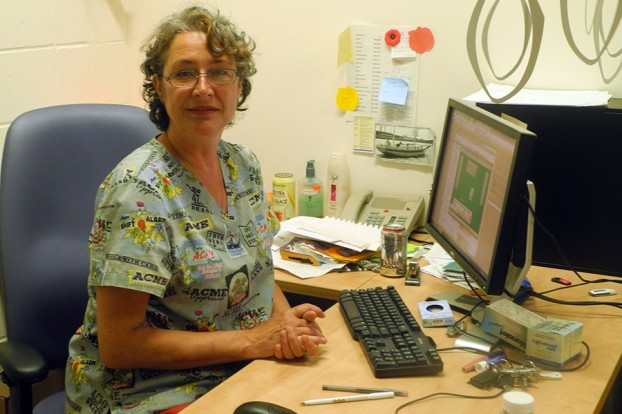Student mental health affects academics, report concludes

Story and photo by Alisa Howlett
Despite her training and confidence in her artistic abilities, Allison Parrott had to put down her paintbrushes in the classroom and give in to her stress and anxiety.
“It was really overwhelming and hard to handle the stress of it to the point where I got a doctor’s note excusing me from a week of class,” Parrott, a former first year art student at Loyalist College said.
Parrott’s story is not uncommon. A study was released Monday that suggested 90 per cent of post-secondary students are stressed, anxious, and feel lonely. Out of the 30,000 students surveyed, 9.5 per cent said they had considered suicide, while 1.3 per cent said they had attempted it.
Lauren Deans, student services health centre nurse at Loyalist College, sees many students about medical issues that can be linked to stress or anxiety.
“A lot of the time we’ll have students coming in with headaches, stomach pain, difficulty breathing, nausea, all kinds of symptoms, so you have to really look at everything and take a total history and go through everything and figure it out,” said Deans. “A lot of the time it’s anxiety.”
Deans has been the nurse at Loyalist for 13 years. Over the years the same factors are believed to be causing stress and anxiety among students but recently more students are recognizing that they might be stressed or anxious, she said.
“[They’re] out of their element. [They’ve] been in high school. A lot of the students are not from Belleville, so they are leaving their high school, they’re leaving their town, they’re leaving their support of the family and friends, and all of a sudden they really feel like a fish out of water,” said Deans. “And that really needs to be prepared for. It’s a hard transition.”
Many post-secondary students also maintain part time and full time jobs during the school year.
“Working and going to school, especially if you’re working full time, is one of the hardest things ever to do. That is something that I was never really prepared for coming out of high school,” said Parrott. “It’s impossible to have a social life. You start feeling really isolated because you’re working all the time and then studying and keeping afloat with all the schoolwork. It’s really crazy.”
Loyalist College, like many other post-secondary institutions, offers academic counseling as well as personal counseling. Mary McConnell, student success mentor at Loyalist notices that students seek her guidance at specific times of the school year are not limited to only mid-term and exam time.
“It also happens in second semester, when people get a certain amount of money that is supposed to last all year and it doesn’t. It never goes as far as you want it to. So they tend to get stressed because they don’t have the funds they think they should have had to last the end of the semester,” said McConnell.
McConnell assesses students and then refers them to more specific counselors that can meet their needs, such as the financial aid office or the mind and wellness practitioner, she said.
While Parrott was studying at Loyalist she met with a school counselor to manage her stress levels and found it helpful. However, she wishes counselors were more readily available, Parrott said.
“It’s almost as though they need more staff. I had to make an appointment for two weeks later when in actuality, I needed to talk to someone right away. I had left it to the point where I needed to talk to someone right away,” Parrott said.
Deans is an advocate for communication between students and parents or professionals to help redirect stress and anxiety.
“It would be nice if there could be a parent and student talk. Maybe high schools having some sort of preparatory class, what you’re going to expect, what you’re losing when you leave them. These are some ways to reconnect, to keep connected to your parents, some of your friends, and supports,” she said.
Louanne Moore, child and youth counselor at Trenton High School, has been guiding students into post-secondary education for eight years. She agrees that more communication between students and educational institutions is beneficial.
“It should be collaborative. It should be everybody on the same page and knowing what’s going on. And doing the warm handoff to someone else once they leave us, at least trying to put some things in place for the students,” Moore said. “Whether that be outside counseling, or counseling through the university to let them know where to go and who to go see.”
Parrott suggested that high schools should teach a money management class.
“There is nothing set up in high school that is going to help you manage your finances. That is a major issue in the world and adulthood, how easily we get in debt, and how hard it is to get out of it. Maybe there should be a little more guidance on how to deal with that,” she said.
Loyalist College is investing in newer ways to help students combat stress and anxiety.
This August the student services health centre will receive two Seasonal Affective Disorder lamps. SAD is a type of depression that can occur when not enough sunlight is present, particularly in winter months. The SAD lamps are supposed to boost endorphins. They will be set up in private rooms that students can book or drop by if they’re available, to work on schoolwork, said Deans.
A significant amount of moral responsibility should be placed on the students to monitor their mental health and their peers, said McConnell.
“The hard part is getting students to come in and say there’s a problem. Often most people like to deal with it on their own and they think they can deal with it on their own,” she said. “Once you’re finished [school] your employer is not going to ask what supports you used. Interdependence is key to being successful as well. Using your supports to help you in any way you can is a great thing.”
All school officials mentioned that students are entering into post-secondary education at a much younger age than years prior, when there was Ontario Academic Credit, or a mandatory fifth year of high school.
It’s not just younger students that suffer, but mature students as well. They have been out of the education system for longer and are disconnected with their sometimes, younger classmates, Deans said.
Parrott didn’t like the idea of competing with other students and had a hard time coping with that, she said.
“What I was mainly feeling was isolation and depression, and being overwhelmed with anxiety. And also not feeling like I was good enough as an artist in comparison to everyone else,” she said.
Although Parrott dropped out of her program just shy of three weeks before semester one was finished, she is still in school debt. She is grateful she is allowed to live at home until she is debt free, she said.
Despite her financial situation and previous post-secondary experience, Parrott is not opposed to the idea of higher education.
“I would like to take a smaller work load or take a few night courses or something like that down the road. I’m not going to give up on school completely. I just don’t think now is the right time for me,” she said.
 Print This Post
Print This Post






